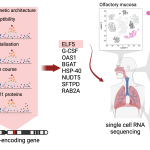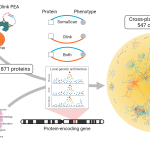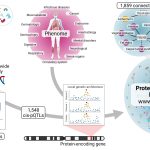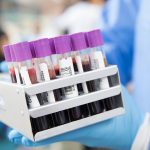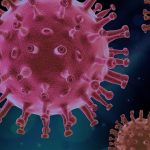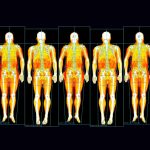Scientists have used a proteomics approach to identify a three-protein signature in the blood that can improve detection of isolated impaired glucose tolerance, a form of prediabetes. The research, led […]
Proteogenomic analysis explains why some people suffer more from COVID-19 than others
A large number of people are still contracting COVID-19. Fortunately, most of them are experiencing only mild symptoms, largely thanks to the high vaccination rate. However, in some individuals the […]
COVID-19 Study demonstrates potential for at home blood sample collection
The ability to collect a blood sample painlessly from people at home without the need of a healthcare worker visit could transform the way healthcare and health research are conducted. […]
Combining proteomics techniques reveals importance of protein structure to health
In a study undertaken in more than 10,000 individuals, and published today in Nature Communications, scientists have shown that integrating information derived from different technologies to measure proteins can identify […]
Filling the gaps: connecting genes to diseases through proteins
Hundreds of connections between different human diseases have been uncovered through their shared origin in our genome by an international research team led by Unit scientists, challenging the categorisation of […]
Cambridge Festival 2021 – Involving people in telehealth research during the COVID-19 pandemic
Involving people in telehealth research during the COVID-19 pandemic – The challenges of scale, engagement and inclusivity Watch a recording of this event on our YouTube channel Advances in online […]
Discovery of genetic regulators of human metabolism and health
An international team led by researchers at the MRC Epidemiology Unit has used a cross-platform approach across several large human studies to identify hundreds of novel genetic variants that regulate […]
Consortium led by Unit researchers develops open platform to help discover COVID-19 drugs
An international consortium led by MRC researchers has developed an open access platform to help prioritise drug discovery and repurposing efforts for the current COVID-19 pandemic. The platform provides information on […]
MRC Epidemiology Unit launches study to monitor COVID-19 in 12,000 Cambridgeshire residents
Participants in Cambridgeshire’s Fenland Study are being invited to join an innovative study that will use a home-administered blood sampling device to find out how many have evidence in their […]
Gene variations that reduce ability to store fat around the hips linked to higher risk of diabetes and heart attacks
People who are less likely to put on excess fat around their hips due to their genes are at higher risk of type 2 diabetes and heart attacks, according to […]

 MRC Epidemiology Unit
MRC Epidemiology Unit
